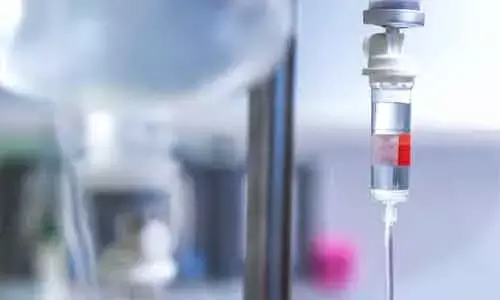- Home
- Medical news & Guidelines
- Anesthesiology
- Cardiology and CTVS
- Critical Care
- Dentistry
- Dermatology
- Diabetes and Endocrinology
- ENT
- Gastroenterology
- Medicine
- Nephrology
- Neurology
- Obstretics-Gynaecology
- Oncology
- Ophthalmology
- Orthopaedics
- Pediatrics-Neonatology
- Psychiatry
- Pulmonology
- Radiology
- Surgery
- Urology
- Laboratory Medicine
- Diet
- Nursing
- Paramedical
- Physiotherapy
- Health news
- Fact Check
- Bone Health Fact Check
- Brain Health Fact Check
- Cancer Related Fact Check
- Child Care Fact Check
- Dental and oral health fact check
- Diabetes and metabolic health fact check
- Diet and Nutrition Fact Check
- Eye and ENT Care Fact Check
- Fitness fact check
- Gut health fact check
- Heart health fact check
- Kidney health fact check
- Medical education fact check
- Men's health fact check
- Respiratory fact check
- Skin and hair care fact check
- Vaccine and Immunization fact check
- Women's health fact check
- AYUSH
- State News
- Andaman and Nicobar Islands
- Andhra Pradesh
- Arunachal Pradesh
- Assam
- Bihar
- Chandigarh
- Chattisgarh
- Dadra and Nagar Haveli
- Daman and Diu
- Delhi
- Goa
- Gujarat
- Haryana
- Himachal Pradesh
- Jammu & Kashmir
- Jharkhand
- Karnataka
- Kerala
- Ladakh
- Lakshadweep
- Madhya Pradesh
- Maharashtra
- Manipur
- Meghalaya
- Mizoram
- Nagaland
- Odisha
- Puducherry
- Punjab
- Rajasthan
- Sikkim
- Tamil Nadu
- Telangana
- Tripura
- Uttar Pradesh
- Uttrakhand
- West Bengal
- Medical Education
- Industry
Early aggressive hydration in acute pancreatitis results in fluid overload without improving outcomes: NEJM

Researchers have found in a randomized trial that early vigorous hydration led to a greater incidence of fluid overload without improving clinical outcomes in patients with acute pancreatitis. The findings of this study were published in The New England Journal of Medicine.
Although early forceful hydration is frequently advised for the treatment of acute pancreatitis, there is less support for this approach. Therefore, in order to confirm the effectiveness of vigorous or moderate fluid resuscitation in acute pancreatitis, Enrique de-Madaria and colleagues undertook this study.
At 18 locations, researchers administered goal-directed aggressive or moderate resuscitation with Ringer Lactate solution to patients who arrived with acute pancreatitis. An aggressive fluid bolus of 20 ml/kg of body weight was followed by 3 ml/kg every hour. A bolus of 10 ml/kg for patients with hypovolemia or no bolus for those with normovolemia was followed by 1.5 ml/kg per hour for all of the patients in this group receiving moderate fluid resuscitation. Patients' clinical state was evaluated at 12, 24, 48, and 72 hours, and fluid resuscitation was modified as necessary. The main result was the onset of mild, moderate, or severe pancreatitis while the patient was being treated in the hospital.
The key findings of this study were:
1. Due to between-group disparities in safety outcomes without a statistically significant difference in the frequency of moderately severe or severe pancreatitis, the experiment was terminated.
2. In 20.5% of patients who underwent vigorous resuscitation and in 6.3% of patients who received moderate resuscitation, fluid excess manifested itself.
3. In the aggressive-resuscitation group, the median hospital stay was 6 days (interquartile range: 4 to 8), whereas in the moderate-resuscitation group, it lasted 5 days (interquartile range: 3 to 7).
Reference:
de-Madaria, E., Buxbaum, J. L., Maisonneuve, P., García García de Paredes, A., Zapater, P., Guilabert, L., Vaillo-Rocamora, A., Rodríguez-Gandía, M. Á., Donate-Ortega, J., Sánchez-Marin, C., Cobreros, M., … Bolado, F. (2022). Aggressive or Moderate Fluid Resuscitation in Acute Pancreatitis. In New England Journal of Medicine (Vol. 387, Issue 11, pp. 989–1000). Massachusetts Medical Society. https://doi.org/10.1056/nejmoa2202884
Neuroscience Masters graduate
Jacinthlyn Sylvia, a Neuroscience Master's graduate from Chennai has worked extensively in deciphering the neurobiology of cognition and motor control in aging. She also has spread-out exposure to Neurosurgery from her Bachelor’s. She is currently involved in active Neuro-Oncology research. She is an upcoming neuroscientist with a fiery passion for writing. Her news cover at Medical Dialogues feature recent discoveries and updates from the healthcare and biomedical research fields. She can be reached at editorial@medicaldialogues.in
Dr Kamal Kant Kohli-MBBS, DTCD- a chest specialist with more than 30 years of practice and a flair for writing clinical articles, Dr Kamal Kant Kohli joined Medical Dialogues as a Chief Editor of Medical News. Besides writing articles, as an editor, he proofreads and verifies all the medical content published on Medical Dialogues including those coming from journals, studies,medical conferences,guidelines etc. Email: drkohli@medicaldialogues.in. Contact no. 011-43720751


